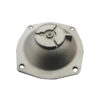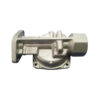Piezas de la tapa de la válvula
Piezas de la tapa de la válvula
El Piezas de la tapa de la válvula Son componentes esenciales para uso civil, diseñados para garantizar una protección fiable del motor y un sellado eficiente en sistemas residenciales. Diseñadas para ofrecer durabilidad y precisión, las piezas de tapa de válvulas ofrecen un rendimiento óptimo para propietarios de viviendas y aplicaciones comerciales ligeras. Reconocidas por su calidad y fiabilidad, son la opción ideal para mantener la integridad del motor.
El Piezas de la tapa de la válvula Son componentes esenciales para uso civil, diseñados para garantizar una protección fiable del motor y un sellado eficiente en sistemas residenciales. Diseñadas para ofrecer durabilidad y precisión, las piezas de tapa de válvulas ofrecen un rendimiento óptimo para propietarios de viviendas y aplicaciones comerciales ligeras. Reconocidas por su calidad y fiabilidad, son la opción ideal para mantener la integridad del motor.
El Piezas de la tapa de la válvula son componentes de sellado estructural Diseñado para proporcionar protección robusta del motor y mantener sellado hermético Mecanismos de válvulas en diversos sistemas residenciales y comerciales ligeros. Ya sea que se apliquen en pequeños motores de combustión, grupos electrógenos o sistemas regulados por presión, estas piezas son fundamentales para garantizar estabilidad operativa a largo plazo evitando fugas de aceite, contaminación y exposición a elementos externos.
Fabricado con materiales duraderos y resistentes al calor, el Piezas de la tapa de la válvula están diseñados para resistir expansión térmica, vibración y exposición química Se encuentran comúnmente en entornos mecánicos y de motores. Su superficies mecanizadas con precisión garantizar un sellado hermético entre la culata y la tapa de la válvula, lo cual es esencial para mantener la presión interna, reducir el ruido y minimizar los ciclos de mantenimiento.
Diseñado con ambos funcionalidad y facilidad de integración En mente, el Piezas de la tapa de la válvula Son compatibles con una amplia gama de tipos de juntas y configuraciones de fijaciones. Esto las hace ideales para su uso en equipos eléctricos residenciales, compresores de HVAC, motores de bombas de riego y otras máquinas industriales ligeras. Su diseño modular también facilita su desmontaje y montaje durante el mantenimiento o la inspección rutinarios, lo que reduce el tiempo de inactividad y aumenta la facilidad de mantenimiento del sistema.
Cada unidad se somete a rigurosas pruebas de calidad, incluida la verificación de planitud, la evaluación de la resistencia del material y la durabilidad del ciclo térmico para garantizar confiabilidad a largo plazo En diversas condiciones de operación. Con total trazabilidad y cumplimiento de las normas industriales pertinentes, Piezas de la tapa de la válvula cuentan con la confianza de técnicos, profesionales de mantenimiento y fabricantes de equipos por igual.
Gracias a su confiabilidad, ingeniería precisa y resistencia a entornos operativos hostiles, el Piezas de la tapa de la válvula son la opción preferida para garantizar integridad del motor y eficiencia de sellado en sistemas de fluidos y potencia modernos.
- Más de 60 tipos de materiales, más de una docena de aleaciones y 70 tipos de números.
- Se pueden producir muchos productos, más de 3500 moldes de fundición de precisión y más de 1000 moldes de fundición en arena.
- Los accesorios de producción pueden ser grandes o pequeños.
- Se puede personalizar un solo producto de 50 kg.
- Hay varios hornos disponibles para seleccionar y se pueden producir piezas individuales de 50 kg a 850 kg.
- Con 20 años de experiencia y maestría, ingresó a la industria en la década de 1980 y se convirtió en el líder de la industria.
- Los productos son trazables y cada producto de horno tiene un certificado: 3.1 Certificado de material.
- Los clientes pueden solicitar a una agencia de pruebas de terceros que emita un certificado 3.2.
- Los productos de primera calidad procesados pueden ser objeto de un certificado de procesamiento.
Ventajas de Leierwo en la fundición de piezas de precisión en la industria de fundición de válvulas
Leierwo lleva muchos años inmerso en el sector de la fundición de precisión, acumulando una amplia experiencia en la fabricación de componentes para válvulas. La empresa se especializa en la producción de piezas fundidas de precisión de acero al carbono, acero aleado y acero inoxidable, materiales comunes en la industria de las válvulas. Mediante tecnologías avanzadas como la fundición por fusión y los procesos de sol de sílice, la empresa logra el moldeo de alta precisión de piezas estructurales complejas, cumpliendo con los requisitos de rendimiento de las válvulas en condiciones de funcionamiento de alta temperatura, alta presión y resistencia a la corrosión. Además, Leierwo prioriza la producción a medida según los planos del cliente, lo que le permite adaptar mejor las piezas fundidas de las válvulas a las necesidades específicas del cliente, garantizando así el sellado y la estabilidad estructural del producto.
Selección del material principal
Las piezas fundidas para válvulas deben soportar condiciones de operación complejas, como presión, temperatura y corrosión. Por lo tanto, la selección del material debe priorizar la resistencia a la corrosión, la resistencia a altas temperaturas, la resistencia a la cavitación y una buena procesabilidad. El acero inoxidable es la opción preferida debido a su excelente rendimiento general.
Materiales comunes:
Serie de acero inoxidable:
316/316L: La mejor opción, resistente a la corrosión de iones de cloruro, adecuado para entornos marinos, industrias químicas y petroleras. 304/304L: Un material económico adecuado para entornos corrosivos generales. 410: Acero inoxidable martensítico, con cierta resistencia a la corrosión, adecuado para válvulas de vapor de alta temperatura.
17-4PH: Acero inoxidable endurecido por precipitación, de alta resistencia y resistencia a la corrosión, adecuado para válvulas de alto rendimiento.
Serie de acero al carbono:
WCB (material general de acero al carbono): se utiliza comúnmente para válvulas de uso general a temperatura ambiente.
4130: Adecuado para carcasas de válvulas de alta temperatura y alta presión.
Serie de aleaciones especiales (para entornos de alta corrosión y alta temperatura): Acero inoxidable dúplex 2205: Excelente resistencia a la corrosión bajo tensión, ideal para las industrias marina y química. Aleación de cobalto (CoCr): como Co6 y Co12, ideal para superficies de sellado de válvulas con daños severos por alta temperatura.
Opciones de servicio de casting de claves
Las válvulas tienen requisitos estrictos de sellado y resistencia a la presión, y la elección del servicio de fundición afecta directamente su confiabilidad funcional:
Fundición a la cera perdida: El método preferido para válvulas de media y alta presión. Componentes como cuerpos de válvulas y asientos de sellado suelen contener cavidades internas complejas (como trayectorias de flujo curvas) y superficies de contacto precisas (p. ej., la rugosidad de la superficie de sellado debe ser ≤ Ra1,6 µm). La fundición a la cera perdida permite replicar con precisión formas complejas, reducir defectos de fundición (como poros y retracciones) y mitigar el riesgo de fugas. Es especialmente adecuada para válvulas de alta presión de acero inoxidable y aleaciones.
Fundición en arena: Adecuada para la producción en masa de válvulas de baja presión y gran escala. Por ejemplo, los cuerpos de válvulas de compuerta de baja presión para el suministro de agua municipal tienen formas relativamente simples (principalmente estructuras simétricas), grandes tiradas de producción y requisitos de precisión moderados. La fundición en arena ofrece ventajas significativas en términos de bajo costo y alta capacidad de producción.
Mecanizado CNC: Se centra en las zonas de contacto críticas. Las bridas de la válvula y los diámetros del eje del vástago deben alinearse con precisión con la tubería o el actuador. Tras la fundición, se realizan fresados y rectificados CNC para garantizar tolerancias de planitud y perpendicularidad de ≤0,02 mm/m, garantizando así un ensamblaje hermético.








